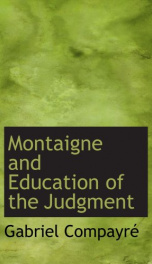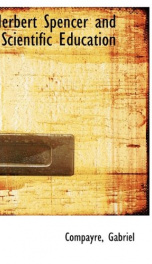montaigne and education of the judgment

Purchase of this book includes free trial access to www.million-books.com where you can read more than a million books for free. This is an OCR edition with typos. Excerpt from book: Montaigne's Pedagogy Montaigne is no pedagogue of the people; alone, in the sixteenth century, the men of the Reformation took any thought of popular education. The plan that he puts before us, in the celebrated chapter Of the Institution and Education of Children, was conceived oiilv fo£-a.son of noble family, happily ,.., situated and of exalted birth his little. .neighbour ' at the castle of Gurson.1 His theme was the education, under the guidance of a carefully chosen "governor" or tutor, of a young nobleman intended by his condition for a Ufe of ea.jjjdpejhajp of idleness. But as of this little nobleman Montaigne wants to make a man, his views often extend beyond the limited horizon of a castle-education, and, many of his maxims are applicable to children of all con- ditions and of all times. Moreover, Montaigne's 1 This Essay, Chapter XXIV of Book I, is dedicated to Diane de Foix, Countess de Gurson, with reference to her child, who, for that matter, was not yet born. Montaigne, with the high spirits of a Southerner, prophesies that this child about to be born must needs be a boy: "for, madam, you are too generous to begin with other than a man-child. . . ." impetuous imagination often carried him far beyond the limits within which he seemed to have intended to keep his reflections; so that while he deals with a private and individual education, it often happens that he touches on pedagogical questions of general import. Lastly, it is not only in the one chapter dedicated to Countess de Gurson that Montaigne discusses education; his whole work is strewn with digressions in which he gives us his own views, or else criticises the teaching and disciplinary methods then in use. "I am fond of reverting to this question of the 'ineptness' of our education." T" Mon... --This text refers to an alternate Paperback edition.
Info about the book
Author:
Series:
Unknown
ASIN:
143650581X
Rating:
4/5 (3)Your rating:
0/5
Languge:
English
Users who have this book
Users who want this book
What readers are saying
What do you think? Write your own comment on this book!
write a commentif you like montaigne and education of the judgment try:
Do you want to exchange books? It’s EASY!
Get registered and find other users who want to give their favourite books to good hands!



